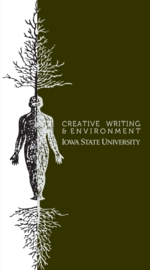Outliers and Environmental Literary Criticism
Panel Discussion
Monday, 27 Feb 2012 at 10:00 am – Campanile Room, Memorial Union
Three literary critics from the Iowa State Department of English will discuss the concept of the environmental imagination in literature. Assistant Professor Brianna Burke will present "Reciprocity: What Environmentalists Can Learn from Native American Literature." Matthew Sivils, assistant professor of English and a former wildlife biologist, discusses "Of Outliers and Archives: Tracking Paul L. Errington's Of Men and Marshes." Lecturer Jeremy Withers presents "Horses, Warfare, and Becoming-Human." Part of the Symposium on Wildness, Wilderness, and the Creative Imagination.Brianna Burke is an assistant professor in the Department of English at Iowa State. Her academic interests are in the environmental humanities, including ecocriticism and multicultural ecologies, but she is particularly invested in environmental justice. She is the author of two articles, "Fighting Reds Onscreen and Off-screen: Ronald Reagan as Cold War Politician and Cowboy in Cattle Queen of Montana," and "The Great American Love Affair: Indians in the Twilight Saga," both of which examine representations of Native Americans in popular culture. Currently she is working on a book that explores the intersections between environmental ethics and Native American cultural and religious traditions.
Matthew Wynn Sivils, formerly a wildlife biologist, is now an assistant professor of English at Iowa State, where he teaches American literature before 1900, as well as courses devoted to American environmental literature from all periods. He has published several scholarly articles on topics in those specializations and has edited three scholarly editions of the writings of Muscogee (Creek) poet and nature writer Alexander Posey, which were published by the University of Nebraska Press. He is founder and coeditor of the award-winning scholarly journal Literature in the Early American Republic and is currently working on a monograph about the origins of American environmental prose. His edition of Paul L. Errington's nature writing classic, Of Men and Marshes, is forthcoming from the University of Iowa Press.
Jeremy Withers is a lecturer in the English Department at Iowa State. His research focuses on the intersections between warfare and nature as represented in medieval texts, as well as on environmental readings of contemporary American literature and film.
----
This lecture was made possible in part by the generosity of F. Wendell Miller, who left his entire estate jointly to Iowa State University and the University of Iowa. Mr. Miller, who died in 1995 at age 97, was born in Altoona, Illinois, grew up in Rockwell City, graduated from Grinnell College and Harvard Law School and practiced law in Des Moines and Chicago before returning to Rockwell City to manage his family's farm holdings and to practice law. His will helped to establish the F. Wendell Miller Trust, the annual earnings on which, in part, helped to support this activity.
Cosponsored By:
- Bioethics Program
- Center for Excellence in the Arts & Humanities
- College of Liberal Arts and Sciences
- Creative Writing Milieu
- Ecology, Evolution and Organismal Biology
- English
- Geology & Atmospheric Sciences
- History
- LAS Miller Lecture Funds
- MFA Program in Creative Writing and Environment
- Wallace Chair for Sustainable Agriculture
- Committee on Lectures (funded by Student Government)
Stay for the entire event, including the brief question-and-answer session that follows the formal presentation. Most events run 75 minutes.
Sign-ins are after the event concludes. For lectures in the Memorial Union, go to the information desk in the Main Lounge. In other academic buildings, look for signage outside the auditorium.
Lecture Etiquette
- Stay for the entire lecture and the brief audience Q&A. If a student needs to leave early, he or she should sit near the back and exit discreetly.
- Do not bring food or uncovered drinks into the lecture.
- Check with Lectures staff before taking photographs or recording any portion of the event. There are often restrictions. Cell phones, tablets and laptops may be used to take notes or for class assignments.
- Keep questions or comments brief and concise to allow as many as possible.



